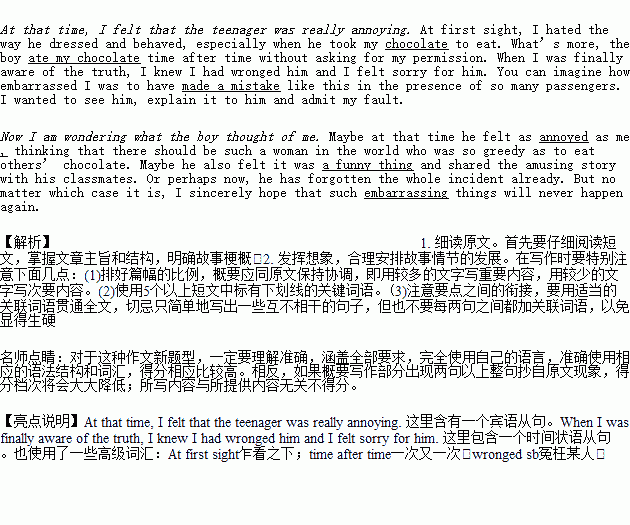题目内容
My husband hasn’t stopped laughing about a funny thing that happened to me. It is funny now but it wasn’t at that time.
Last Friday, after doing all the family shopping in town, I wanted a rest before catching the train, so I bought a newspaper and some chocolate and went to the station coffee shop—that was a cheap, self-service place with long tables to sit at. I put my heavy bag down on the floor, put the newspaper and chocolate on the table to keep a place and went to get a cup of coffee.
When I came back with the coffee, there was someone in the next seat. It was one of those wild-looking teenagers, with dark glasses and torn clothes, and hair colored bright red at the front, not so unusual these days. What did surprise me was that he had started to eat my chocolate!
Naturally, I was annoyed. However, to avoid trouble—then really I was rather uneasy about him—I just looked down at the front page of the newspaper, tasted my coffee, and took a bit of chocolate. The boy looked at me closely. Then he took another piece of my chocolate. I could hardly believe it. Still I didn’t want to start an argument. When he took a third piece, I felt more angry than annoyed. I thought, “Well, I shall have the last piece.” And I got it.
The boy gave me a strange look, and then stood up. As he left, he shouted out, “This woman is mad!” Everyone stared at me. That was really embarrassing enough, but it was worse when I finished my coffee and got ready to leave. My face went red—as red as his hair when I realized I’d made a mistake. It wasn’t my chocolate he’d been taking. There was mine, unopened, just under my newspaper.
注意:
1. 所续写短文的词数应为150左右;
2. 所使用5个以上短文中标有下划线的关键词语;
3. 续写部分分为两段,每段的开头语已为你写好;
4. 续写完成后,请用下划线标出你所使用的关键词语。
At that time, I felt that the teenager was really annoying. _________________________________________
______________________________________________
Now I am wondering what the boy thought of me. ______________________________________________
______________________________________________

